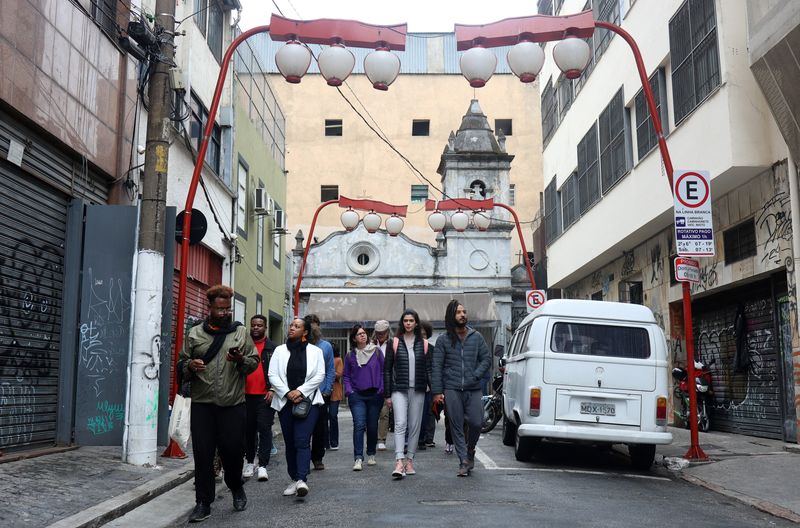By Dani Morera Trettin
SAO PAULO (Reuters) – São Paulo’s Liberdade neighborhood, residence to the most important Japanese group outdoors Japan, is famend for its Asian-style structure, eating places and public lighting resembling paper lanterns.
Hundreds of vacationers benefit from the space’s delicacies and tradition, usually unaware of the neighborhood’s Black historical past.
The title “Liberdade” (liberty in English) has been linked to the story of Chaguinhas, a previously enslaved Black soldier who was sentenced to dying in 1821 after he led a protest for higher wages, prompting spectators to the execution to name for his “liberty.”
“When people see the neighborhood, there is another history being told,” mentioned Debora Pinheiro, a information on a tour attended by Reuters. “The Japanese arrived in the early 20th century and started a process of gentrification. But the Black presence is still huge.”
Afrotourism – tourism with a concentrate on Black historical past – is a rising business in Brazil. Guia Negro, a corporation based in 2018, goals to disseminate the customarily neglected historical past in Brazil. It now provides excursions in 22 cities, together with Salvador, Rio de Janeiro, and São Paulo.
In 2023, the tourism company introduced that it might promote companies along with tourism. The identical 12 months, Pequena Africa (Little Africa) in Rio de Janeiro had extra guests than the enduring Christ the Redeemer or the Sugar Loaf mountain (Pão de Açucar), in keeping with the company, which cited information from the Rio mayor’s workplace.
Pinheiro mentioned that the addition of “Japao” (Japan) to the title of Liberdade’s metro station by business initiative highlights how Black historical past remains to be erased in São Paulo.
Regardless of not being often known as the “Blackest city outside of Africa” like Salvador, within the northern state of Bahia, or the neighborhood of Little Africa in Rio de Janeiro, the town of São Paulo has the most important inhabitants of Black individuals in Brazil in absolute numbers.
Black American vacationers are amongst Guia Negro’s most frequent shoppers, selecting Brazil as a extra welcoming vacation spot.
“Brazil made me feel like a Black queen,” mentioned Dr. Chanel Adrian Clifton, who participated within the tour. “I feel very welcome, powerful, and understood.”
Guilherme Soares Dias, the founding father of Guia Negro, began the group after experiencing frequent racial profiling overseas. “I wanted to create a platform to encourage more Black people to travel and for everyone to learn more about Black history and culture,” he mentioned.
Guia Negro emphasizes historical past training to fight prejudice.

In October 2020, cops, alerted by social media posts a couple of “Black march,” got here to the tour. For 3 hours, they questioned, filmed, and adopted the organizers, suspecting the paid touristic tour was a protest.
In April 2024, a choose ordered the São Paulo State to pay 750 thousand reais ($138 thousand) to Guia Negro in compensation for “moral collective damage and discriminatory action, with clear outlines of institutional racism.”




